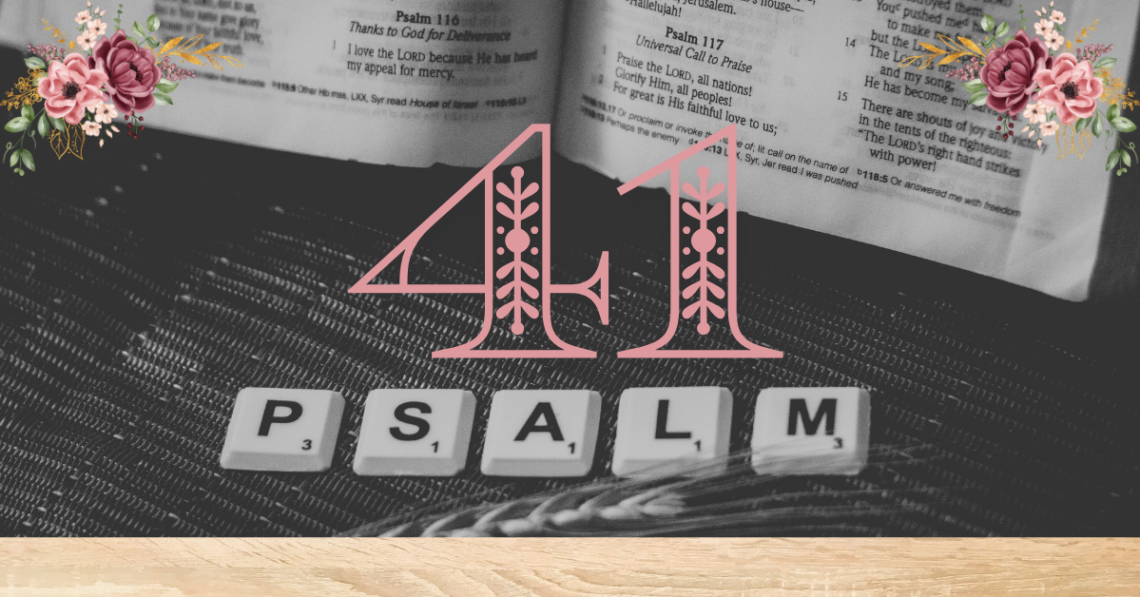Psalm 41 is a psalm of David that highlights God’s care for those who show compassion to others. David opens by acknowledging the blessings of caring for the poor, and he expresses confidence that God will deliver and sustain those who act with mercy. The psalm also contains a personal plea for healing and protection from enemies, showing us the value of trusting God during times of betrayal and sickness.
Background of Psalm 41
This psalm serves as the conclusion of Book I of the Psalms (Psalms 1–41). It reflects both David’s deep relationship with God and his struggles with enemies, illness, and betrayal—perhaps referencing the treachery of a close companion like Ahithophel. The psalm reminds us that the Lord values mercy, upholds the righteous, and is faithful even when others are not.
What Does Psalm 41 Mean?
Psalm 41 presents a combination of blessing, suffering, and hope:
- Verses 1–3: David begins with a declaration that the person who considers the poor will be blessed by the Lord. God promises protection, healing, and sustenance to those who live with compassion.
- Verses 4–9: David transitions into a personal lament, asking for God’s mercy and healing. He recounts how even close friends have turned against him—foreshadowing the betrayal of Christ by Judas in verse 9.
- Verses 10–13: Despite his hardship, David ends with a strong affirmation of God’s faithfulness and asks for God to raise him up. He finishes with praise, showing his continued trust in the Lord.
This psalm reminds us that God is not only aware of how we treat others but also actively responds to our needs when we act justly and kindly. It also comforts those facing betrayal or illness, reminding us that God never abandons His people.
Verse Mapping Psalm 41:1
“Happy is one who is considerate of the poor; the Lord will save him in a day of adversity.” (CSB)
- Word Study
- Happy: Often translated as “blessed.” This is not just emotional happiness but a state of spiritual well-being and favor from God.
- Considerate: Thoughtful, attentive to the needs of others, especially the marginalized.
- Poor: Not just financially lacking, but also those who are weak, afflicted, or vulnerable.
- Day of adversity: A time of trouble, distress, or hardship. God’s response is timely and personal.
- Cross-References
- Proverbs 19:17 – “Kindness to the poor is a loan to the Lord, and he will give a reward to the lender.”
- Matthew 5:7 – “Blessed are the merciful, for they will be shown mercy.”
- James 1:27 – “Pure and undefiled religion before God the Father is this: to look after orphans and widows in their distress.”
- Paraphrase Blessed is the person who cares for those in need—God promises to rescue them in their own time of trouble.
- Application Caring for the poor isn’t just charity—it’s a reflection of God’s heart. When we show compassion, God promises to watch over us, deliver us in hardship, and strengthen us. Our treatment of others opens the door to God’s blessing and protection in our own lives.
How Can We Apply Psalm 41 Today?
- Practice Compassion This psalm begins with a clear call to care for others, especially the vulnerable. Ask God to open your eyes to the needs around you—whether it’s financial support, emotional encouragement, or simply your time.
- Trust God During Betrayal David’s experience of betrayal reminds us that even those closest to us may hurt us, but God never will. When you feel betrayed, take comfort in knowing that Jesus understands, and God is your defender.
- Ask Boldly for Healing David pleads with God for healing, showing us that it’s okay to ask God to restore our health—physically, emotionally, and spiritually. He listens to the cries of His people.
- Cling to God’s Faithfulness Even when others turn away, God remains. David ends with a declaration of God’s eternal faithfulness and reign. We can trust that God’s promises never fail.
- Live a Life That Reflects God’s Mercy When we model God’s mercy, we bear His image to the world. Let your daily actions—especially toward the least of these—be a testimony to the character of God.
Reflection Questions
- Who are the “poor” in your life that God is calling you to consider?
- How can you show mercy and compassion to others this week?
- Have you experienced betrayal or hurt from someone close to you? How can you turn to God with that pain?
- How have you seen God’s faithfulness in times of adversity?
A Closing Prayer
Lord, thank You for Your unfailing mercy and love. Help me to live with compassion and kindness toward those in need. When I face betrayal or hardship, remind me that You are my refuge and healer. Strengthen me in times of adversity, and let my life be a reflection of Your mercy and faithfulness. I praise You, God, for always being near. Amen.
Final Thoughts
Psalm 41 beautifully captures the heart of God for the vulnerable and the suffering. It reminds us that how we treat others matters to God—and that when we act with compassion, we can trust Him to care for us. No matter the trials we face, whether sickness, betrayal, or hardship, God is faithful to deliver and uphold us.
Share the Truth
Encourage someone today by sharing Psalm 41. Whether they’re walking through illness or feeling the sting of betrayal, remind them that God sees, cares, and delivers.





